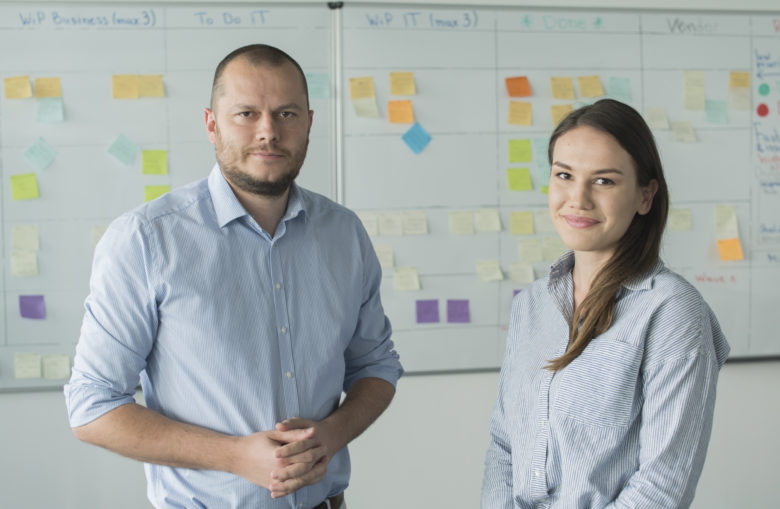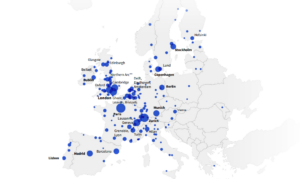Elevator Lab: Sometimes The Great Innovations in Banking Don’t Even Come From the Fintech Space

Inside Raiffeisenbank Bulgaria there’s a team of nine people who wear sneakers, work in sprints, follow agile methodologies, coordinate external IT teams and talk to startup founders. They don’t exactly fit into the traditional banker’s figure. These are young experts who take care of the digital transformation and innovation within the institution and are also the ones who execute Elevator Lab Challenge, Raiffeisen’s CEE Fintech accelerator. They work alongside founders to further develop and eventually implement their products within the bank’s systems.
The applications for this year’s edition of Elevator Lab have recently opened and startups with already developed products can apply till June 21 ![]() . Fintech innovation is the focus, but any other solution that might disrupt processes or systems is also in the scope. For the first time this year there’s a separate track for early-stage companies – The Bootcamp.
. Fintech innovation is the focus, but any other solution that might disrupt processes or systems is also in the scope. For the first time this year there’s a separate track for early-stage companies – The Bootcamp.
Daniel Aleksiev, Head of Digital Banking and Innovation Department, and Yoanna Genova, Manager at the same department and also coordinator of Elevator Lab in Bulgaria, give some insights on the whole process – from application through PoC to long-term partnerships with RBI.
Trending Topics: What is the team of Elevator Lab looking for this year?
Yoanna Genova: We have eight specific topics and they are perfectly aligned with the areas where RBI is looking for solutions to existing issues or opportunities – both internal and external. There are Advanced Analytics & Artificial Intelligence, RegTech, Corporates & Institutional Clients, Digital Payments, Retail Banking, SME banking, Cyber Security, and Forex Solutions.
One of the main topics, of course, is PSD2 – the regulation that gives us many opportunities and also obligates us in a way to open up to other banks and companies.
“PSD2 is a golden opportunity for fintech companies to look for scale up and to enter the banking ecosystem. Elevator Lab is exactly the gate to benefit from this opportunity and integrate their products.” – Yoanna Genova
Daniel Aleksiev: We want to go beyond the standards and the traditional products like loans etc. Topics like customer experience are the highlight. Therefore, I want to outline that not all the companies that successfully go through the Elevator Lab Challenge and end up integrating with the bank are fintech companies by default. One example is last year’s global finalist Pisano, a UK customer experience management company, we’ve already done a PoC in Bulgaria. Despite not being a fintech they fitted perfectly into our strategy – to be the most recommended financial institution by 2025. There are so many other cases. My message to the founders is to think in a broader context.
What’s the goal with the bootcamp track for early-stage companies?
D.A.: This new program is a result of the gaps we observed last year. We are offering training in lean startup methodology and pitching skills. What we saw in the global program is that companies and startups from Western Europe and the US are very professional in terms of presentation and the pitching. The ultimate goal is to help early-stage ventures, even new teams with clear concepts, to prepare for the next year’s challenge.
What are the selection criteria?
Y.G.: The eight areas we’ve listed are the first gate. We are also looking at the use cases – solutions to a broader problem, instead of very niche products, are preferred. The solutions should be suitable for the whole RBI group in CEE.
D.A.: The team is another criterium, solopreneurs are not our target. Especially in the financial sector, companies need to have cross-disciplinary teams with diverse expertise. The engagement is another important factor. It’s not a secret that one of the teams from the first years’ edition didn’t show this engagement and commitment. Once selected, we’d expect from the team to reserve time for proper PoC and work dedicatedly with us. At the end of the day, our team also invests time and resources and RBI gives a great scalability opportunity.
There’s this common understanding that fintech companies are more flexible and adaptable than large banking institutions. Why is a partnership with Raiffeisenbank interesting for a fintech startup with a competing product?
D.A: First of all, banks are operating in a very regulated environment. So, from this point of view not everything that we think is cool and trendy could go to the market as fast as we desire it. Especially when we take into account the regulations in Bulgaria, experts with experience and know-how from the sector are needed advisors.
“The bank could be the hearth of an ecosystem, this is our general direction. Especially for young companies, it’s a rather easy entry point to the market. Instead of a client by client acquisition approach, startups could benefit from the customer base we’ve built over the years.” – Daniel Alexiev
Y.G.: Banks are primarily looking for cooperation with fintech startups, we don’t want to look at them as competitors. We have the history, the trust, the customer base, and a large portfolio of products. The security of the systems we’ve built and the trust of the customer base is what we can offer. Most of the fintech companies are not regulated and partnering with a bank is an acceleration ticket.
Sometimes new solutions and ideas are easily stifled within large structures. What does the PoC process look like inside the bank? What do you do to prevent this within Raiffeisenbank?
Y.G.: The rather small and flexible team that’s responsible for Elevator Lab and Innovation processes in general plays a crucial role. When it comes to startups, first they get direct contact with the C-level management of the bank, then there’s a structured PoC process within our team – a dedicated mentor, who is responsible for involving other experts with relevant knowledge and know-how. And not least, there is a six months time frame for the PoC.

And what’s next after the PoC which is usually on a local level? How are solutions transferred within the RBI network? Is there any internal recommendation process?
D.A.: For this, we have a cloud platform called Merlin that allows integration of different solutions on a group level. It’s our digital enabler for tests and sandboxes. Each bank from the network has the access and their systems are integrated with it so it’s very simple to try out the solutions implemented in Merlin. Anything that’s on the market in terms of technology is concentrated there. All the products that made it to Elevator Lab’s global finals are already in Merlin, some of the local winners too. The products that are suitable for very local and specific needs are first integrated within the local banks’ system and then transferred to Merlin. For instance, Evrotrust has been contacted for PoCs in Albania and Romania after the one in Bulgaria.
RBI also has an investment fund – Elevator Ventures, which is a way for RBI to get a share of the startups. What’s the overall strategy when working with startups and are there any limitations for the portfolio companies?
Y.G.: The fund itself is focused on rather small investments and minority stakes in the companies. It is, however, in partnership with the Austrian VC Speedinvest, and not an internal structure, which means the portfolio companies are not tied to RBI in any way. We are not looking for acquisitions, but rather want to partner with startups, benefit from being early adopters and form the development of the products. In this regard, there are also no limitations for the companies that work with RBI or have received an investment from Elevator Lab to work with other financial institutions and banks.

























